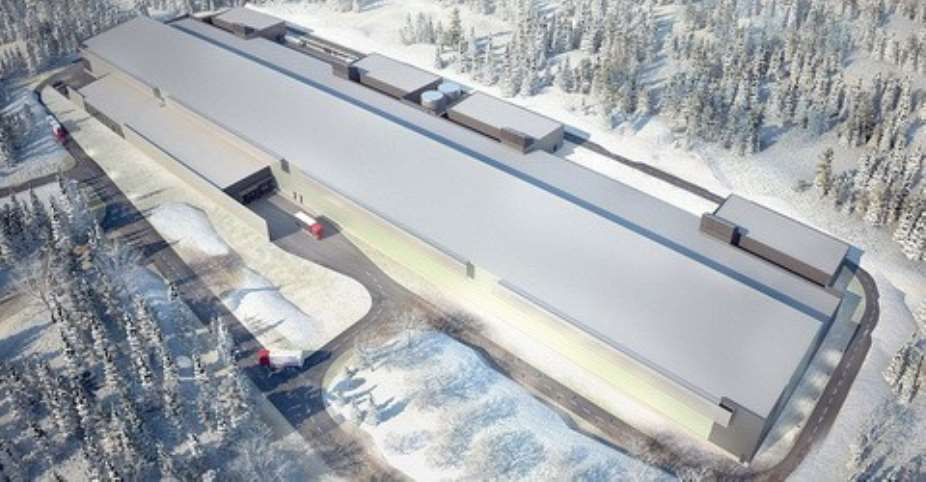Facebook's new server farm in the northern Swedish city of Lulea is the firm's first outside the U.S. - in a location chosen because the fierce cold will help to keep the company's racks of high-performance computers cool.
Facebook looked at several sites across Europe, and picked Lulea for its cold climate. The move will see Facebook become faster for users across Europe.
'Facebook has more users outside the U.S. than inside,' Facebook director of site operations Tom Furlong said. 'It was time for us to expand in Europe.'
He said European users would get better performance from having a node for data traffic closer to them. Facebook currently stores data at sites in California, Virginia and Oregon and is building another facility in North Carolina.
Companies rely on additional data centres not only to provide faster connections for people nearby, but also as backup in event of a system failure.
BlackBerry's recent service collapse was a testament to the damage that can be caused by companies having too few data centres to shoulder the load if one hits a technical hitch.
Located 60 miles (100 kilometers), south of the Arctic Cicle, Lulea lies near hydropower stations on a river that generates twice as much electricity as the Hoover Dam on the border of Nevada and Arizona, Facebook said.
In case of a blackout, construction designs call for each building to have 14 backup diesel generators with a total output of 40 MW.
The Lulea data center, which will consist of three 300,000-square foot (28,000-square meter) server buildings, is scheduled for completion by 2014. The site will need 120 MW of energy, fully derived from hydropower.
While many server farms rely on chiller systems, Facebook's will use an advanced cooling system powered by evaporating water.
For around eight months of the year, the plant will cool itself using the icy outside air.
The heat from the server racks will also warm up the offices at the plant.
Facebook didn't give the price of its investment, but Lulea officials have previously projected construction costs of up to 5 billion kronor ($760 million).
'We knocked on doors at Facebook's head office (in Palo Alto, California) and today they're moving in to Lulea — this is huge, really huge,' said Matz Engman, who heads the Lulea Business Agency, a public-private partnership working to attract businesses to the region.
With winter temperatures well below freezing and summertime highs that rarely climb above 80F (25 degrees Celcius), Lulea has used its frigid climate as a selling point in its efforts to establish itself as a hub for server farms.
Other Nordic cities have adopted similar strategies.
In 2009 Google purchased a paper mill in Hamina, southern Finland, and turned it into a data center, using seawater from the Baltic Sea for its cooling system.
Servers inside data centers are the backbone of Internet services such as Facebook. The servers store and transmit billions of status updates, links, photos and all the outside apps used by Facebook's members.





 Whoever participated in the plunder of the state must be held accountable – Jane...
Whoever participated in the plunder of the state must be held accountable – Jane...
 A vote for John and Jane is a vote to pull Ghana from the precipice of destructi...
A vote for John and Jane is a vote to pull Ghana from the precipice of destructi...
 I’ll repay your abiding confidence with loyalty, understanding and a devotion to...
I’ll repay your abiding confidence with loyalty, understanding and a devotion to...
 ‘I’ve learnt deeply useful lessons for the future' — Serwaa Amihere breaks silen...
‘I’ve learnt deeply useful lessons for the future' — Serwaa Amihere breaks silen...
 I’m sorry for the embarrassment – Serwaa Amihere apologises for leaked sex video
I’m sorry for the embarrassment – Serwaa Amihere apologises for leaked sex video
 Dumsor: Matthew Opoku Prempeh not in charge of Energy sector – Minority
Dumsor: Matthew Opoku Prempeh not in charge of Energy sector – Minority
 Adu Boahen’s murder: Police arrest house help who was in possession of deceased’...
Adu Boahen’s murder: Police arrest house help who was in possession of deceased’...
 Akufo-Addo nominates Felicia Attipoe as Tema West MCE
Akufo-Addo nominates Felicia Attipoe as Tema West MCE
 Election 2024: I can't have someone I defeated twice as my successor – Akufo-Add...
Election 2024: I can't have someone I defeated twice as my successor – Akufo-Add...
